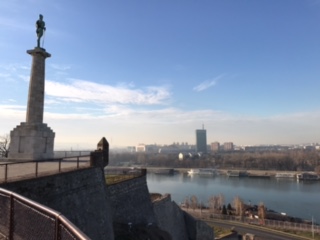Western Balkans
Return to Belgrade
Again in Belgrade, after my last visit in 2014 when I was still leader of the S&D group in the European Parliament. My first official visit was during Milosevic times when Belgrad was particularly dark. I tried to establish some contacts with the local level in a Yugoslavia which was suffering from sanctions. I wanted to bring at least the capital of that country into a dialogue with other capital cities of the region.
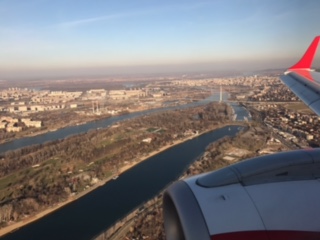
Together with the then mayor of Athens and present Commissioner Avramopoulos and the former mayor of Ljubljana and later Foreign minister Dimitrij Rupel I could found a Conference of mayors of South Eastern Europe. It was not easy to bring people from different countries especially from former Yugoslavia with very diverse attitudes to the common state of the past to sit at one table. Later I visited Serbia often as Vice president of the European Parliaments Committee for South East Europe and as President of the Socialist Group. Now I came in my relatively new function as chairman of the board of the Centre for Democracy and Reconciliation in South Eastern Europe (CDRSEE) located in Saloniki.
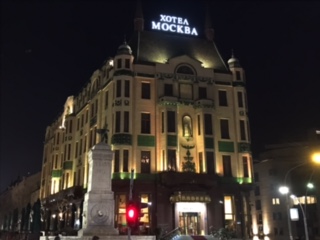
The region of my attention is the same, the Balkans, and unfortunately it changed not so much as was expected and wanted. In Belgrade the Saloniki center CDRSEE celebrated the fifth year of the Vicinities (Okrujene) program of televised discussions of citizens including experts and politicians across the borders of the Balkans. The most famous one has been a discussion between the Prime ministers of Serbia and Albania, Aleksandar Vucic and Edi Rama, which was held in Vienna 2015 during the follow up of the so called Berlin initiative.
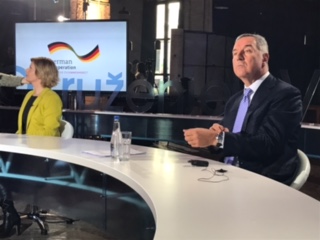
After the presentation at a well attended press conference I participated in a televised discussion with the former president of Croatia, Stipe Mesic, the multiple prime minister of Montenegro, Milo Djukanovic and the executive director of the European Fund for the Balkans, Hedwig Morvai. The discussion was moderated by the director of the CDRSEE in Saloniki, Zvezdana Kovac. This televised program is offered to various TV stations in the whole region and should contribute to a better understanding of the different problems in the region but also inside the EU.
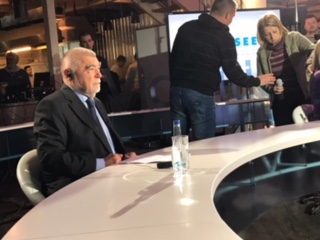
Changes, but not too many
The Western Balkans, as they are called officially inside the European Union, are still in a very fragile situation. There is some economic progress, some ugly dictators disappeared but it is still a region with many democratic deficiencies. Civil society is again and again trying to bring more democracy and transparency into the social fabric but it is a hard work with many setbacks.
Sasa Ciric, editor of the magazine „Beton“ defined the Balkans as the region which starts „where the strong have priority over the weak and where this „natural situation“ is not seen as wholly normal and desired but is seen as an unavoidable habit which has to be tolerated“. Several talks I had with journalist and experts in Belgrade, confirmed that definition and deplored that this is still true for many Balkan countries today.
And the Belgrade artist Uros Djuric sees an irrational development in Serbia: „There exists a gap between the declared aim, that the state apparatus has to follow European rules, to achieve accession to the European Union and the wide spread corruption which is tolerated even supported at all levels of society, starting from the justice system via the monopolistic structures in trade and politics to the promotion of feelings of insecurity amidst the citizens, who are used to corrupt officials in order to achieve any decision in their favor.“
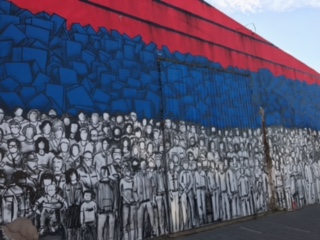
In fact with whomever one speaks, even with openminded representatives of the ruling parties, this gap between the European aspirations on the one hand and the resistance to reform and open up the political structures on the other hand is clearly noticeable. One of the clearest proof of that resistance is the dominance of the secret services. As the former ambassador to Vienna and famous Serbian writer Dragan Velikic expresses it: „Belgrade continues to be the hotbed of the only unreformed secret service in Eastern Europe, who has also organized and perpetrated the killing of the first democratic Prime minister of Serbia, Zoran Djincic.“
There exist also a gap between the European orientation and a sympathetic look towards Moscow. Russia is using a lot of soft power from extensive media presence to quick help in case of natural disasters to support their brotherly relationship with Serbia. Looks one carefully to the real figures of the financial support, one has to realize, that they are way behind European aid and help activities. But propaganda wise, they react much quicker and more skillful. And they attach no conditions concerning democracy, freedom of media and human rights.
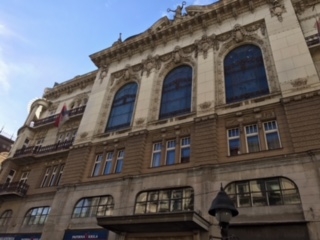
Balkan peculiarities
Historically and until today you find many peculiar characteristics in South East Europe. On of them is the amount and strength of rumors. On the one hand there exist rumors about an attempted killings of the -former- prime minister of Montenegro, Milo Djukanovic organized by Russians with Serb citizens involved. The clear positioning of Djukanovic for NATO and EU should be the reason for that attempt. On the other hand there exist rumors about an attempted killing of Serbian Prime minister Aleksander Vucic which should have been organized by the USA. It will be difficult to find out the truth and in the meantime other rumors will be spread and real killings will be perpetrated.
Of course the Western Balkans have many characteristics which you can find in other European regions as well. But here they seem to be stronger embedded in „traditional“ political structures and/or at least more on the surface than underneath. Sreten Ugricic, born in Hercig Novi, who calls himself SRETEN, proved with a long list of specific Balkan phenomena like killings of politicians, hiding of perpetrators of crime against humanity, bad treatment of minorities especially Roma, widespread xenophobia etc. that there are many parallels between the West and the South East of Europe. So criticism of the situation in the Balkans is necessary and justified but it should be combined with modesty and self-criticism on the side of the critics from the „West“ including the European Union.
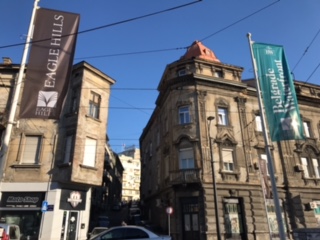
Renewal in Belgrade
According to Dragan Velikic, Belgrade is a metropolis because it contains a multitude of cities at one place. And that is certainly true for the Serbian capital as it is true for Vienna etc. Is Belgrade beautiful? Well here Velikic draws a comparison with Humphrey Bogart: „Belgrad is in the same way beautiful as Humphrey Bogart“. And that is not a bad comparison, which he made to a friend while both where standing in the Kalemegdan Park where the Save flows into the Danube. And it is a special place which I visit whenever I am in Belgrade.
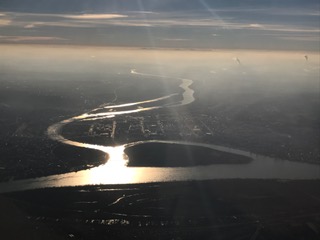
Of course one could also have a more negative opinion of the urban structure of Belgrade. Nikola Samardzic, a philosopher and historian in Belgrade expressed it like that: „Belgrade has been the subject of countless urban architectural failures, becoming a conglomerate of stylistic and aesthetic controversies, a cacophony of discarded rights and interests……Belgrade is as a human community and culture the historical loser in all the wars and political conflicts in the 20th and at the beginning of the 22st century“
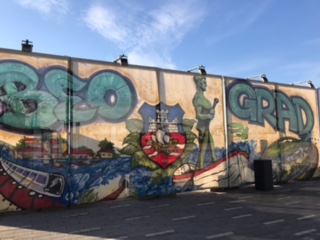
So Belgrade should have the possibility finally to be on the winning side. It would need a comprehensive but nevertheless decent and careful rehabilitation, especially along the river Save, which gives the city a special location and flavor. In fact a development project for the Belgrade Waterfront has started. Strangely enough it is undertaken by a company called Eagle Hills from Abu Dhabi who is active in Bahrain, Jordan, Morocco and Nigeria. I don’t know why this company has been chosen but I think that this company with possible references from African cities could not gain any experiences in these countries which are helping Belgrade and its citizens to achieve an urban development which is respecting the specific economic, social and cultural conditions of Belgrade. Many with whom I could talk see it like this and they complain about the lack of transparency of Eagles Hill’s activities – which are anyway not too many until now.
Being in Belgrad reminds me always of that wonderful former mayor, artist and architect Bogdan Bogdanovic. He was psychologically pushed out of Belgrade and whole Serbia by nationalist forces during the Milosevic area. The mayor of Vienna Helmut Zilk was approached by Austrian friends of his and I as member of Viennese government responsible for urban development and planning was asked to help Bogdanovic to resettle in Vienna. I will never forget his warm personality without hate towards his opponents and with a vivid intellectual mind until his death. Belgrad would have needed people like him to combine renewal with respect for tradition and a human approach.
